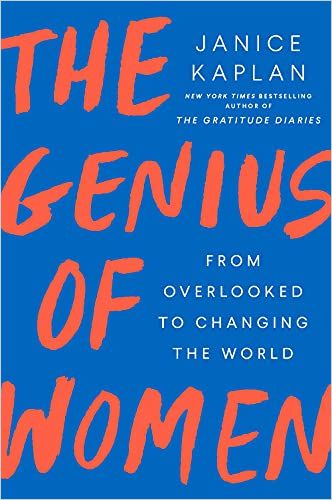Bestselling author Janice Kaplan offers an honor roll of accomplished women – fearless geniuses, all.

No Fear
A recent survey shows that 90% of people think of geniuses as male. That’s the patriarchal norm. Today’s genius women overcame that limiting notion – and many others – to thrive in arenas where men have been the gatekeepers. As bestselling author Janice Kaplan recounts, these women bypassed traditional male-female roles by believing in themselves and their abilities.
The issues that genius women face have remained constant through the generations.Janice Kaplan
Kaplan writes for the 90% who need to know that women still face obstacles akin to the ones their sisters faced hundreds, if not thousands, of years ago. Yet, some triumphed, and Kaplan tells their stories.
Gatekeepers
Women and men often still believe men’s actions and work matter more than women’s deeds and achievements. Society regards men as gatekeepers and rule makers. The male perspective often structures social beliefs and customs that become invisible – just part of the environment – because they represent the dominant reality. No one has anything to compare them to.
Many men recognize overt sexism or inappropriate boundary violations, but have problems discerning more subtle power behaviors, such as opening doors for women, which may seem to be a simple courtesy, or complimenting their appearance. And, Kaplan says, when women relinquish their power, they give up some chances of being equal.
Genius requires some combination of innate intelligence, passion and a dedication to hard work.Janice Kaplan
Kaplan’s women of genius overcame multiple roadblocks to rise above society’s expectations. Women today have more chances to do groundbreaking work than women in the past, Kaplan finds, but roadblocks still impede them.
Genius Women
Take Katherine Johnson, for example. Her calculations at NASA enabled John Glenn’s historic orbit of the Earth. The movie Hidden Figures showcased the pivotal roles she and her female colleagues played in the early days of NASA.
The Nobel Prize for Science went to Otto Hahn for his work on “fission of heavy atomic nuclei” – nuclear fission – but Hahn’s colleague Lise Meitner discovered and fully understood the theory behind it. She noted that the concept of nuclear fission remained “very remote” to Hahn. Physicists believed the Nobel Committee’s reasons for awarding the prize to Hahn were “bias, political obtuseness” and “ignorance.”
Most people cling to their false beliefs about what women can achieve because it’s easier than letting facts get in the way. Janice Kaplan
Ignoring or denigrating women’s scientific contributions dates back to the time of Socrates. His contemporary Hypatia, the genius astronomer, is the earliest-known female mathematician. René Descartes appropriated the ideas of a 16th-century nun. Émilie du Châtelet‘s 17th-century book on physics was among the most important scientific works of her day.
Although Oxford University admitted women to degree-earning programs in 1920, it wasn’t until 1948 that it could boast a female full professor.
One great advantage in being a woman who thinks about new ways to see the world is that you don’t waste a lot of time thinking about how the world sees you.Janice Kaplan
In music, as recently as the 1970s, only 5% of the musicians in major American orchestras were women.When orchestras held blind auditions – judges can hear musicians play, but don’t see them – the number of women in orchestras increased significantly.
Salary studies demonstrate how society under-regards women . Computer coding was once a non-lucrative woman’s occupation. When men took over these jobs, pay and the status increased. As women became biologists, salaries in biological science fell by 18%.
New Rules
Parents and cultures send girls limiting messages that restrict many girls’ ambition and potential. Women who blaze new trails, whose works rank in the genius category, don’t fit the norms; they create their own.
They don’t necessarily fight the stereotypes as much as ignore them. Janice Kaplan
They don’t emulate men, and they challenge traditional female roles. Some women regarded Facebook COO Sheryl Sandberg’s book, Lean In, with consternation, saying it was the system that had to change, not women. Sandberg noted that women can change the system only from “positions of power.”
Unfortunately, modern society perpetuates ignoring female genius.Vanity Fair wrote on the future of artificial intelligence (AI) and featured 20 “thought leaders” – all men. The magazine, for example, excluded Dr. Fei-Fei Li, co-director of the Stanford Institute for Human-Centered Artificial Intelligence. Li designed a system for AI learning – utilizing on almost a billion images – that emulates how children learn. Her work is now ubiquitous in AI.
In 2014, biochemists Jennifer Doudna and Emmanuelle Charpentier discovered how to change genetic structure by replacing one piece of DNA with another. Their technique, called CRISPR, won the $3 million Breakthrough Prize. Two years later, a male author at a competing lab wrote an article that purported to be a history of the process that barely cited the women. The researcher’s peers excoriated him, and now many scientists build on Doudna and Charpentier’s foundational work. And in 2020, Doudna and Charpentier won the Nobel Prize in Chemistry.
Disney’s Princesses
Disney Studios’ 2016 film Moana featured a strong female lead, but most Disney films showcase men rescuing female characters or telling them they must dampen their power.
In The Little Mermaid, for example, Ariel gives up the ability to talk to get her prince. And in Frozen, Elsa has to hide her powers.
Society embraces this stereotype: Boys are superheroes; girls should wear gowns and be quiet. Parents may tell daughters they can do anything, but the toys, images and characters surrounding girls signify that society disagrees.People see power as something women grab – something they have no right to own.
No matter how much talent you start with, you can’t grow into a star if you don’t have the opportunity to develop your gifts. Janice Kaplan
Dr. Frances Arnold, who won the 2018 Nobel Prize in Chemistry, believes in being fearless. Her research on evolution dovetails with her belief that science can find new solutions by involving people of different backgrounds and perspectives. She urges young women not to give in to fear.
A Clear Mission
Kaplan, a novelist venturing into non-fiction territory, has a clear mission – to help women of all ages understand the misogynist cultural assumptions they may have internalized and to fight those assumptions. Her most responsive audience may most likely be younger women for whom Kaplan’s assertions are new, women looking for role models and men trying to find a clue. Experienced feminists can only nod. Kaplan is sometimes polemical, but her examples prove surprising, illuminating and engaging, and her sincerity moves the narrative forward.
Janice Kaplan also wrote the novels The Gratitude Diaries, I’ll See You Again, A Job to Kill For, The Men I Didn’t Marry and Looks to Die For.




